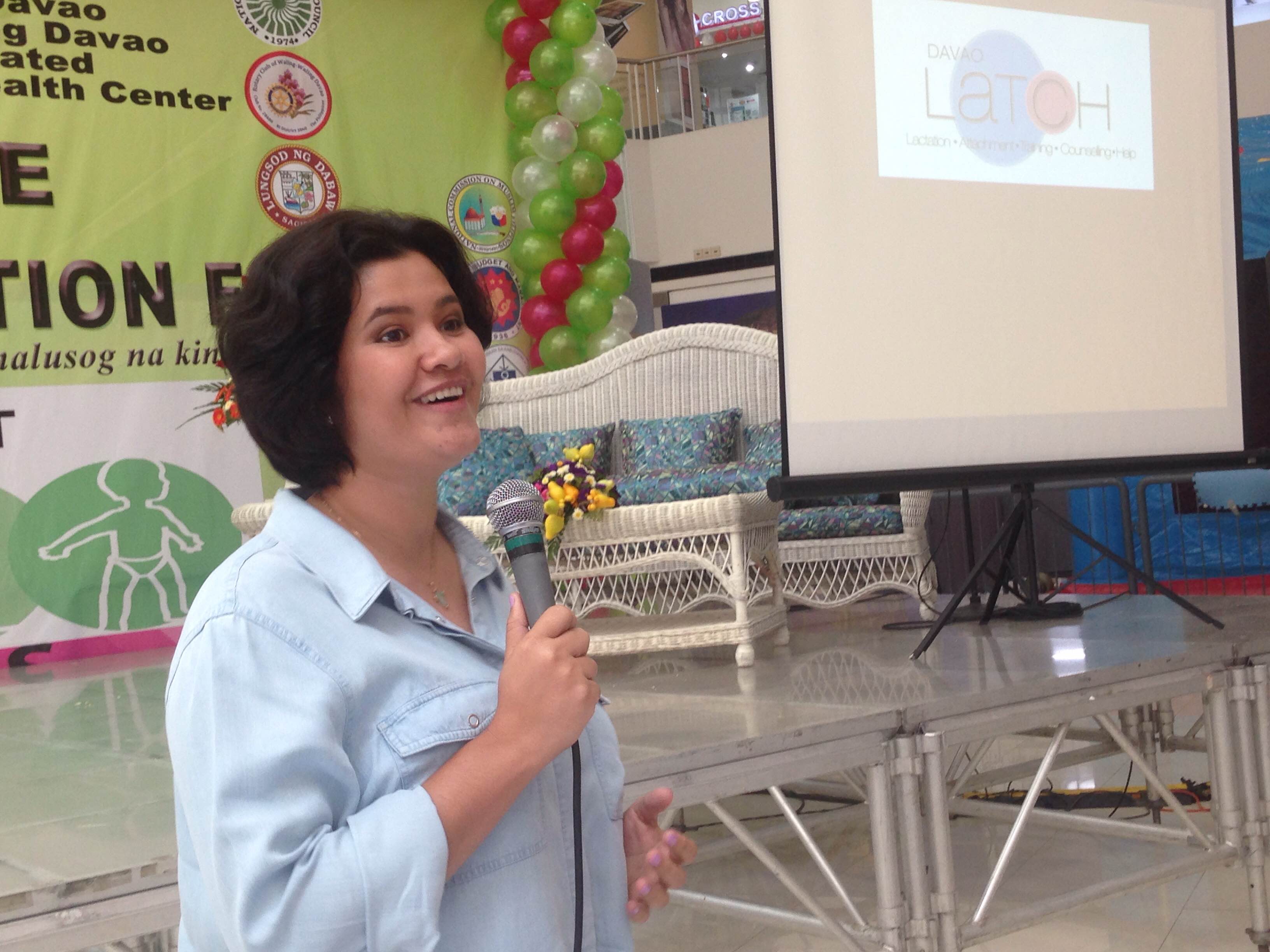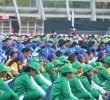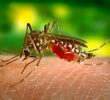
LATCH DAVAO President Alex Hao speaks about breastfeeding myths to health workers and mothers during the nutrition fair organized by the National Nutrition Council Region 11 at the SM Annex in Ecoland, Davao City on July 27. (Zea Io Ming C. Capistrano/davaotoday.com)
DAVAO CITY – Nineteen-year old Mylene Labuca usually argues with her husband about breastfeeding their 11-month old son after a stressful work like doing their laundry.
“My husband tells me that I always need to rest first before breastfeeding the baby because he might get sick, that he could take in my stress,” she said. Almost always, the baby ends up crying waiting to be nursed.
Labuca was among the participants during the nutrition fair organized by the National Nutrition Council on Wednesday, July 27 where LATCH Davao President, Alexandria Hao presented a few of the breastfeeding myths they encountered in their breastfeeding talks.
One of the myths was that a mother must not breastfeed her child when she is stressed because it could affect the taste of the milk or that it could make the baby sick.
“It’s not true because breastfeeding releases hormones such as prolactin and oxytocin that help mothers and babies relax. Stress will not affect the taste of the milk,” Hao said.
Breastfeeding myths are still among the challenges seen by advocates as one factor that makes breastfeeding sound complicated.
In an interview with Davao Today, Hao said that myths “can interrupt breastfeeding.”
“Mothers end up taking unnecessary steps,” she said, citing the case of Mylene.
“For example, the idea that a mother skipped a feeding, shouldmake her discard a little of her milk because that milk is thought of to be old, or about to get spoiled. And so she should discard that before allowing baby to latch. This is just added effort to the mother,” she said.
Hao added that myths make breastfeeding complicated, “which should not be”.
Where do myths come from?
Julie Lapaz, a member of LATCH Davao said myths “come from genuine observations from our grandparents’ time.”
“Usually, whatever effect they see on the baby, they backtrack and see where the cause may have come from. Sometimes, breastfeeding is one of the causes that they may see in certain effects in babies,” she said.
Lapaz said when explaining myths to first time mothers, they “usually end up amazed or wonder and really think the myth through”.
She said during their talks, they provide the scientific basis for the explanation.
“When a mom would tries to explain her situation and tells us that a myth happened to her, we actually probe more on her situation and what had happened. It is usually from probing that we get to bottom of the concern and the actual reason as to why the myth seemed real to her,” she said.
And because we can do away with myths, LATCH Davao, which acts as a support group for mothers and families to promote and protect breastfeeding, include myths in their seminars in barangays or other organizations who invite them for a talk.
“In order for breastfeeding to be considered a success, mothers need to arm themselves with not only knowledge, but support from their family,” Lapaz said.
She said that they see breastfeeding as a “learning process of both the mom and the child”.
“Moms don’t need to pressure themselves with numbers and comments from everyone, the fact that they choose to breastfeed is already the best start for their child,” she added.
Filipino myths about breastfeeding
Here are some of the myths which, according to LATCH Davao should be corrected to “promote and protect” breastfeeding:
1) Myth: You should feed the baby from both breasts because one breast is rice, the other is viand.
Fact: Both breasts make breast milk. Babies do not need to “finish”both breasts to get a complete meal.
2) Myth: The baby has a cradle cap because he is allergic to breast milk.
Fact: Cradle cap is a relatively common condition in newborns and children as old as three years old and causes thick, white or yellow scales on the scalp. It is not contagious and is not a condition caused by poor hygiene. Cradle cap goes away on its own.
3) Myth: I should stop breastfeeding when I have colds and flu because the baby might get sick.
Fact: It is best to continue breastfeeding even when sick in order to pass on antibodies to the baby and help him fight the illness. The risk of catching the illness is higher if you do not breastfeed. Flu, diarrhea, cough, colds, and mastitis are not reasons to stop breastfeeding. What mothers need when she is sick is help around the house and help with the baby not to stop breastfeeding immediately.
4) Myth: I need to take in more soup to produce more milk.
Fact: You do not need anything special to maintain supply. At 16 to 22 weeks gestation, a mother can start producing milk. After birth, mom and baby should be together as frequent feeding and skin to skin contact between mother and baby will signal moms body that it is time to release what the body has prepared for the baby. Our first milk is called colostrum and is rich in antibodies.
5) Myth: I can only breastfeed until my baby is two years old. The milk has no more nutrients when the baby is older.
Fact: The longer the mothers breastfeed, the more likely their children were to score higher on vocabulary tests and intelligence tests.
This is based on UNICEF’s statistics on 50 percent of the world’s population breasted for at least 2 years old. However, in non-Western countries where formula milk has not become the norm, the average age is 3 years old.
6) Myth: Breastfeeding makes the breasts sag.
Fact: Gravity, aging, and sudden drop in weight make the breasts sag. During pregnancy, breasts also stretch as it gets heavier and fuller, but this stretching may contribute to sagging whether you are breastfeeding or not.
7) Myth: Mothers are martyrs and if breastfeeding hurts, you should just bear it.
Fact: It may be uncomfortable, but it should never hurt to a point that the mom would want to stop breastfeeding. If you feel that it’s too painful to breastfeed, you should get help either to correct the baby’s latch or to check if there is an infection.
8) Myth: Formula milks are similar to breast milk now. Formula milk can even make the baby more intelligent.
Fact: Formulas are inexact copies of breast milk and contain no antibodies, no enzymes, no living cells, and no hormones. (davaotoday.com)










